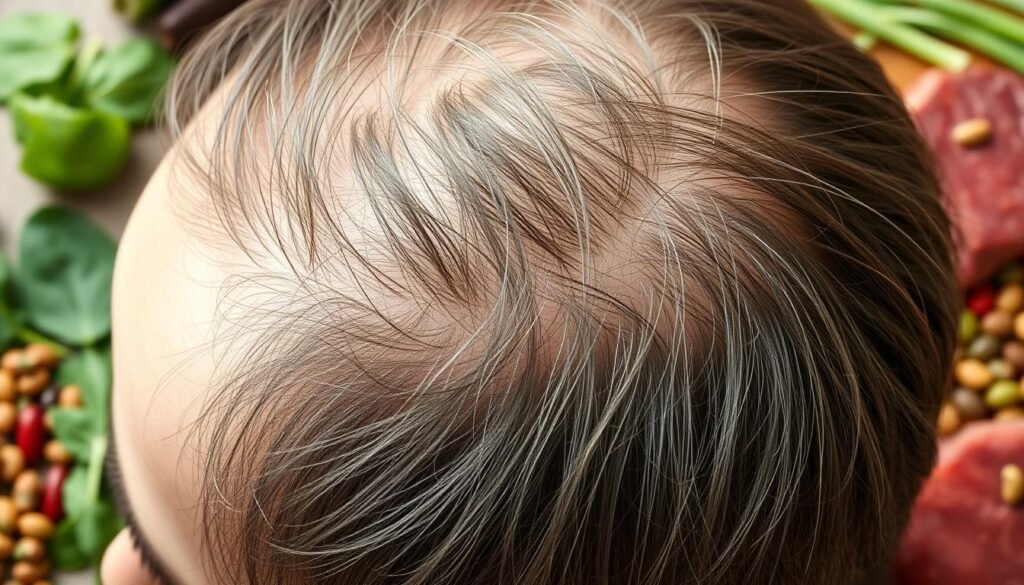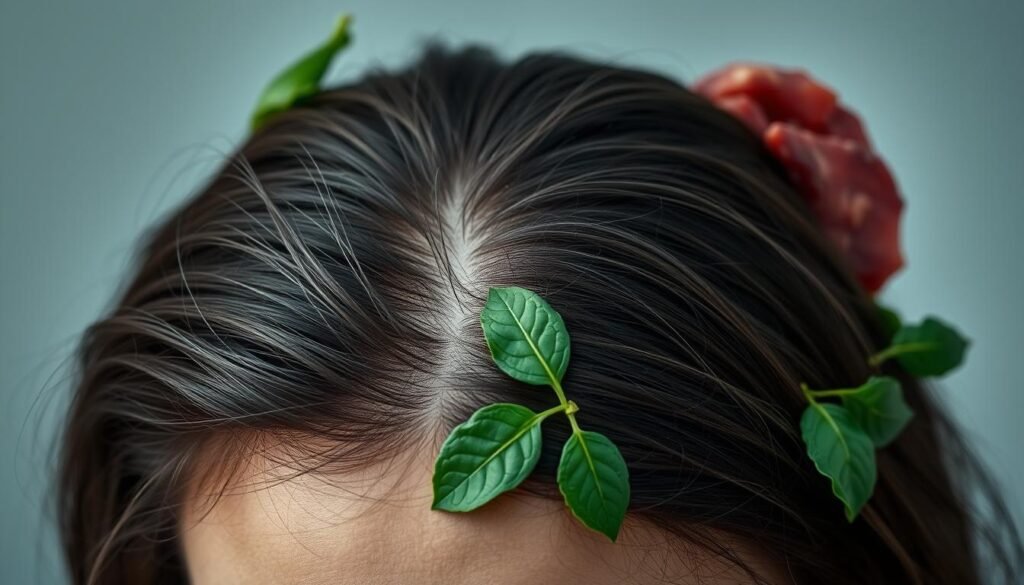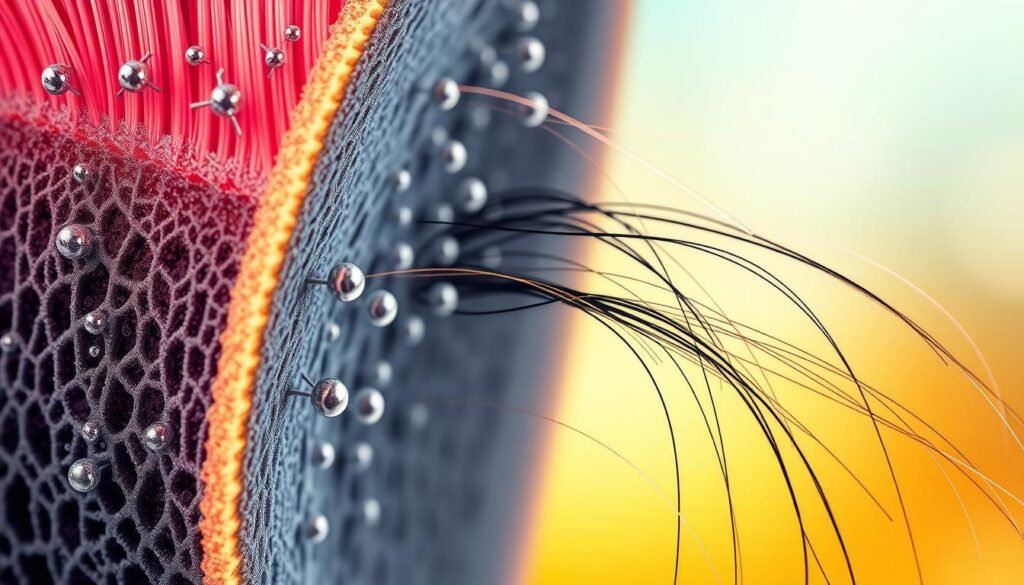It might shock you, but over 500 million people worldwide have iron deficiency. Many of them don’t know how it affects their hair health. Iron levels play a big part in our physical health and also in hair loss. Yet, this connection is often missed. This article will look into how iron deficiency causes hair loss. We will also talk about ways to treat hair loss that is due to not having enough iron.
Key Takeaways
- Iron deficiency is a common issue affecting over 500 million people worldwide.
- Women of reproductive age, vegans, and pregnant women are particularly vulnerable.
- Symptoms like fatigue, weakness, and hair loss may indicate iron deficiency.
- The link between iron levels and hair health is significant yet often underestimated.
- Dietary sources and supplements can help improve iron deficiency and may restore hair health.
- Recognizing the symptoms early can lead to effective treatments for hair loss.
Understanding Iron Deficiency
Iron deficiency is when your body doesn’t have enough iron to make hemoglobin. Hemoglobin is what carries oxygen in your blood. Not having enough can lead to health problems like anemia. It’s key to know how causes of hair loss from iron deficiency can impact your health.
What is Iron Deficiency?
Talking about understanding iron deficiency means we’re looking at not having enough iron. This can make you feel tired, look pale, and even cause hair loss. There are many reasons why people might not have enough iron, showing why it’s important to know and prevent it.
Common Causes of Iron Deficiency
There are a few main reasons why someone might not have enough iron, including:
- Not eating enough foods rich in iron
- Having heavy periods, especially for women
- Being pregnant, which makes you need more iron
- Having gut problems like Crohn’s disease or ulcerative colitis
- Giving blood often or having internal bleeding
Iron deficiency is pretty common, mainly among women and those who don’t eat much iron. Kids drinking too much cow’s milk can have trouble absorbing iron too. For more details, check this link.
Iron Deficiency Symptoms
Iron deficiency can affect your health in many ways. It’s important to catch the symptoms early. You might feel more tired, look different, or even notice changes in your hair.
Physical Symptoms and Their Impact
Iron deficiency can cause several physical symptoms, including:
- Extreme fatigue: Feeling tired all the time, even after resting.
- Pale skin: This happens when your body makes fewer red blood cells.
- Brittle nails: Nails may become fragile and break easily.
- Sore tongue: Your tongue might hurt or feel uncomfortable.
- Shortness of breath and rapid heartbeat: These happen as your body tries hard to get enough oxygen to your tissues.
These symptoms are serious and can lead to anemia. Anemia happens when you have low hemoglobin levels. It makes it hard for your body to work right.
Identifying Anemia: A Result of Iron Deficiency
Anemia is often linked to not having enough iron. Women are especially at risk. This condition can make you very tired and cause hair loss. Studies show not having enough iron might lead to hair loss, mostly in women. For men, the evidence isn’t strong yet. But, it’s clear that iron is important for healthy hair growth.

Hair Loss Iron Deficiency: Is There a Connection?
Understanding the link between hair loss and iron deficiency is important. A lot of people deal with this issue. Studies show a strong link between low iron levels and hair loss. This affects both women and men. Not having enough iron can really impact the health of your hair.
Exploring the Relationship Between Iron Levels and Hair Health
Many people, especially women of child-bearing age, are iron deficient. They often notice hair loss first. Things like monthly periods and not eating enough red meat can cause this. Low iron means not enough blood and nutrients get to the hair roots, which stops growth. Click here to learn more about how iron deficiency affects hair loss.
Types of Hair Loss Linked to Iron Deficiency
Some kinds of hair loss are linked to not having enough iron, including:
- Female Pattern Hair Loss (FPHL): This is common in women before menopause and is linked to low iron.
- Telogen Effluvium: Heavy exercise can cause this, affecting how your body absorbs iron.
- Diffuse Hair Loss: This general thinning of the hair happens when you’re anemic from not eating enough iron.
It is important to keep an eye on your iron levels with blood tests. Finding and treating hair loss due to low iron can really help.

Why Does Iron Deficiency Cause Hair Loss?
Iron deficiency secretly plays a big role in hair loss. It’s important to know how iron works in our hair. Iron helps cells grow and stay healthy in our hair roots. This affects how our hair grows and cycles.
If we don’t have enough iron, our hair follicles don’t work right. They might stop growing hair too soon. This leads to hair loss.
The Role of Iron in Hair Follicle Function
Iron is super important for our hair. If we don’t have enough, it could cause the type of hair loss seen in men and women. Iron helps get oxygen to the hair roots. Without enough oxygen, hair starts to fall out faster than it grows.
A study in 2013 with 200 people showed that not having enough iron could make you lose more hair. Low iron levels are definitely a problem for our hair.
Understanding Telogen Effluvium
Telogen effluvium happens when you’re stressed or not getting enough nutrients like iron. Your hair might start resting too early, and then it begins to thin and shed. But the good news is this kind of hair loss can be fixed. Once your iron levels are good again, your hair should get better. It might take a few months, though.
If you’re curious about how health issues affect hair loss, check out this resource.

How to Treat Hair Loss Due to Iron Deficiency
To deal with hair loss caused by low iron, start with a correct diagnosis. This often includes looking at your diet and if you need supplements. Knowing if you have low iron is key to fixing the problem. Blood tests that check serum ferritin and hemoglobin levels are very important. They tell doctors about your iron levels. Adding the best supplements for hair loss and iron can make a big difference. They help get your iron levels back to normal and improve how your hair looks.
Blood Tests and Diagnosis
Doctors often suggest blood tests for people who might not have enough iron. This can include feeling tired, getting headaches, and having weak hair. Over 500 million people in the world are affected by iron deficiency anemia. Tests like serum ferritin show how much iron your body has stored. Hemoglobin tests check how well your blood can carry oxygen. Finding out if you have an iron shortage is the first step in finding a good hair loss treatment.
Recommended Iron Supplements
After figuring out if you have an iron deficiency, your doctor will suggest the right iron supplements. Men and women need different amounts of iron each day. Men usually need 8.7 mg, and premenopausal women need about 14.8 mg each day. Older women need about 8.7 mg too. There are many types of iron supplements, like ferrous sulfate and ferrous gluconate. Using these as suggested can really help get your iron levels back to where they should be. Eating the right foods along with taking supplements can make this even better. This ensures you get enough iron every day.
| Type | Recommended Daily Dose | Supplement Examples |
|---|---|---|
| Men | 8.7 mg | Ferrous sulfate, Ferrous gluconate |
| Women (ages 19-50) | 14.8 mg | Ferrous fumarate, Iron polysaccharide |
| Women (postmenopausal) | 8.7 mg | Iron chelate, Ferrous sulfate |
Eating foods high in iron along with taking supplements is a smart move. As your body’s iron levels get better, you’ll start seeing changes. You might notice less hair falling out and your hair getting thicker within a few months. Eventually, you’ll have stronger and healthier hair.
Iron-Rich Foods for Preventing Hair Loss
Eating foods high in iron is key to stopping hair loss due to lack of iron. Many foods have the iron and nutrients needed for strong, healthy hair. Knowing which foods are good for this is important for great hair health.
Top Dietary Sources of Iron
There are many foods full of iron. Adding them to your meals can boost your iron levels:
- Red meat
- Poultry
- Seafood
- Beans and lentils
- Tofu
- Fortified cereals
- Leafy greens such as spinach
To absorb more iron, eat plant-based iron with foods high in vitamin C. For example, eating beans with bell peppers or strawberries helps absorb more iron. It’s vital to eat a mix of iron-rich foods to prevent hair loss.
Creating a Balanced Diet for Healthy Hair
Eating a variety of foods is essential for a balanced diet. This includes fruits, vegetables, and proteins. These nutrients support overall health and make hair strong. The amount of iron you need every day depends on if you’re a man or woman, and other factors, such as:
| Group | Recommended Daily Iron Intake (mg) |
|---|---|
| Women | 18 |
| Pregnant Individuals | 27 |
| Lactating Individuals | 9 |
| Men | 8 |
| Women over 51 | 8 |
An iron-rich diet does more than fight hair loss. It also wards off fatigue and other signs of not having enough iron. To learn more about what foods to eat, check out this article on nutrition for hair growth.
Signs of Iron Deficiency and Hair Loss
Knowing the early signs of iron deficiency is key for your health. It helps prevent problems such as hair loss. You might feel more tired, weak, and look paler than usual.
Noticing more hair falling out, especially when brushing or washing, could mean iron shortage. This affects your health and your hair’s wellbeing.
Recognizing Early Symptoms
Here are symptoms to look out for if you’re worried about iron deficiency and hair loss:
- Fatigue: Feeling tired all the time may mean you lack iron.
- Pale complexion: If your skin or the inside of your mouth looks pale, it might be anemia.
- Increased hair shedding: Losing a lot of hair while styling or washing is a sign to watch.
- Heart palpitations: An unusual heartbeat could point to severe iron lack.
When to Consult a Healthcare Professional
If you see any signs of iron deficiency and hair loss, talk to a doctor. They can confirm it with a blood test called FBC. Quick action may involve iron supplements for six months and changing what you eat.
Ignoring symptoms can lead to serious issues like heart problems or weak immunity. Knowing how iron affects hair can help find the right treatment to bring back its strength.
| Symptom | Description |
|---|---|
| Fatigue | Constant tiredness affecting daily activities |
| Pale Skin | Reduced pigment in skin, particularly visible in the face and palms |
| Hair Shedding | Increased hair loss when brushing or washing hair |
| Heart Palpitations | Awareness of rapid or irregular heart rhythms |
Natural Remedies for Hair Loss Caused by Iron Deficiency
Dealing with hair loss because of low iron can mean changing what you eat and how you live. These changes can improve your iron levels, helping your hair grow better.
Holistic Approaches to Hair Care
Natural treatments for hair loss focus a lot on keeping the scalp and hair roots healthy. Using gentle methods to wash your hair and avoiding too much heat keeps hair safe. Massages for the scalp boost blood flow, making a good environment for hair to grow.
One research showed that men got thicker hair after massaging their scalp every day for months. Eating foods high in iron is key for healthy hair too.
Lifestyle Changes for Improving Iron Levels
Improving your iron levels means changing your lifestyle for better hair health. Exercise and stress-reducing activities like yoga or meditation make a big difference. Good sleep helps with iron absorption and keeps hair strong.
Eat foods rich in iron, like clams, lentils, and spinach, especially if you’re vegetarian. Vegetarians might need more iron from plants than meat eaters. Taking supplements like saw palmetto and pumpkin seed oil helps too, along with eating well.
Conclusion
It’s key to know how hair loss ties to not having enough iron. Over a quarter of women in rich countries deal with hair loss. And if they don’t have enough iron, the risk goes up. Studies show a big connection, especially in women with certain kinds of hair loss. They found these women had much lower iron levels.
For those losing hair because of low iron, getting checked and treated is crucial. Fighting hair loss means finding out what’s missing in your body. People with specific hair loss conditions may improve by getting their iron levels up. This might mean eating more iron-rich foods or taking iron supplements. Talking to doctors can help find the best way to get your hair healthy again.
Knowing about iron and hair loss helps people act early. If you notice hair loss symptoms, getting the right treatment is important. By making sure you have enough iron, through food or supplements, your hair can start to thrive again. Taking care of your iron levels is good for your hair’s health.